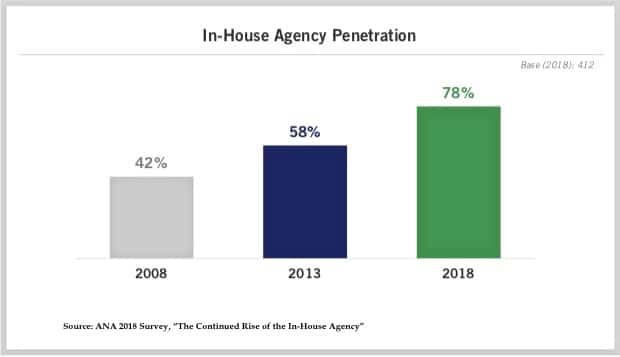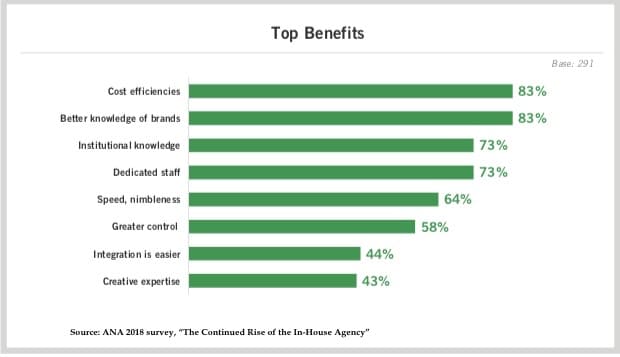This is the first of a series of articles highlighting some of the issues agencies and marketers will focus on during 2019.
DYI fever has not escaped the marketing community. During this decade, marketers have turned into makers, embracing new channels and media with in-house “innovation labs” and “content studios” turning out everything from social media posts to virtual reality movies.
In the process, brands have been redefining the in-house agency and its purpose, debating how internal shops and agencies-of-record should work, and how brands must relate to each. At meetings large and small during 2018, marketers and agencies argued the benefits of one relationship over another.

“You can’t do everything in house,” he said, “but you can’t overdepend on your agency.”
A new survey released earlier this year by the ANA found 78% of marketers had an in-house agency in 2018, up from 58% in 2013 and 42% in 2008. Most of those agencies are recent; 44% of those polled said they had established them in the last five years. And those agencies are doing more recently; nearly two thirds of the marketers polled said the agencies’ workload had increased “a lot” in the last year.
“Another way that works”
Marketers are looking to form tighter connections with their ad agencies, for the sake of agility and efficiency. They’re building in-house agencies and content studios, but also making their outside agencies work more closely, practically as an extension of their own house teams. This has led to a running debate on which structure works best: the in-house agency or the outsourced agency of record, and whether the time has come to rely on a hybrid of both.
Not long after Charney high-fived his house agency, Erick Dickens, CMO King’s Hawaiian argued that hiring an agency or record did not make sense for his company, a small brand looking to expand. Agency fees cover the creative work, but also include management and other expenses that don’t benefit the client, he noted. And the team that wins the pitch may not be the one that is available to the client on a daily basis, he added.
“We had to come up with another way that works,” he said. Being a small brand, his company chose to work directly with properties like Food Network Magazine and Mark Burnett Productions on sponsored content and other sponsorship opportunities. But it acquired help to work closely with the team on other needs by helping talented creatives start their own agencies, such as Levit and Associates, which created the first Super Bowl spot for the brand.
Rather than the traditional in-house shop, built by large global marketers to leverage efficiencies of scale in both creative and media buying work, the new in-house shops are often specialized studios. The ANA survey found content marketing was the most popular specialty, offered by 75% of in-house shops in 2018, while data and marketing analytics had been the most popular specialty five years ago, offered by 42% of house agencies.
The benefits of the in-house agency are clear in the age of real-time marketing, say supporters. The house agencies have the edge in brand knowledge and proximity; they can turn around work at the speed of ideas.

“If we had done this with our agency we’d have to figure out a fee” and negotiate all conditions she said, “and then two months would have elapsed.” Instead, two studio staffers jumped into Hershey mascot costumes, posed for pictures with the couple at the company’s Hersheypark amusement park, and the whole thing was done in a week.
“We’re a small, scrappy team. I’m here to tell you anyone can do it,” she said. Many agencies were reluctant to do short-form video for social media for their own reasons, so having the studio sorted that out, she said.
“An extension of our team”
However, Baskin noted that Hershey still works with agencies for other brand needs. “I think competition has been good for the advertising industry,” she said. The search for additional partners “made them sharper, made them stronger.”
Outside agencies are still necessary, say their defenders, because marketers can’t do it all, either. If the agency understands the client’s business, it can be a help in sorting vendors and tools, serving as a sounding board and filter for the client, say insiders.
“Our agency partners are an extension of our team,” said Lauren Radcliffe, VP marketing, media and acquisition at E*Trade. “We need our agency partners to thrive.”
Bringing all the work in-house is not feasible, she said. Agency partners “that speak our language” can help, said Radcliffe, who estimates she receives 100-150 unsolicited pitches from marketing companies every day.
“We need to make sure our agencies can thrive because it can’t be a sustainable model that agencies go away,” she said.
Indeed, the ANA report found that 90% of marketers who have in-house agencies also work with outside shops. The most common reasons were limited bandwidth in the in-house team and the need for some specialized skills not available internally. While cost efficiencies are still the top benefit seen by marketers—cited by 83% in the ANA poll—it is matched by a better knowledge of brands, also cited by 83%.
Clorox Co. has had an in-house agency for almost 20 years, but it also works with agencies for record for its brands and its own content studios. AORs “play a big role to make sure that we’re laying down the big brand ideas that will kind of endure over time,” said CMO Eric Reynolds. But he added “quite frankly, the amount of content we have to produce now and the velocity we have to produce is really a challenge for an in-house agency.”

“It’s a really big challenge, but getting that ecosystem to function well is probably one of our most significant challenges,” said Reynolds “But if we can unlock it, we think it’s a tremendous source of opportunity.”
The most important factor in agency relationships, whether in-house or out, is having clear lines of work and communications, said Hershey’s Baskin: “Be very clear about who does what.”
Having everything in-house is not for everyone, noted King’s Hawaiian’s Dickens: “If you think it’s hard to fire an agency, imagine firing an agency that’s part of the company.”
Come back to Velocitize in the next weeks for more of the issues to watch in the new year, from marketing marijuana to the maturing social influencer.







Join the conversation